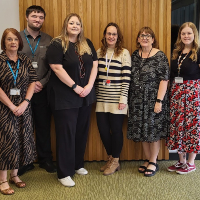View semester dates

BA (Hons) Social and Public Policy
Understand the causes of social problems and how societies attempt to address them
Year of entry: 2026/27
View semester dates
8th in the UK for Social Policy (including Criminal Justice)
41st in the world for Social Policy and Administration
A BA in Social and Public Policy will enable you to understand the causes of social problems and how societies attempt to solve them, both nationally and internationally.
Course content
You'll start your study of social and public policy by undertaking core modules that give you key issues surrounding social and public policy. As you progress, you'll tailor your degree with option modules that allow you to focus on issues and policies that interest you.
During your degree, you will consider the diversity of human needs and sources of inequality at local, national and global levels; and analyse the social, political and economic context in which they exist. Graduates will understand and improve societal responses to social problems and disadvantage.
You will also actively examine the complexity of the policy-making process in the UK and beyond. You will learn how to investigate and critically assess the role of policy actors, citizens, governments, and markets in shaping policy, and to evaluate the evidence on which policy is based.
Year 1
In your first year you'll study core modules that will introduce Social and Public Policy and the social sciences.
Core modules
- Power, Policy and Social Progress
- Contemporary Issues in Social and Public Policy
- Economy and Society
- Social Evils in the Chocolate City
- Social Harm and Injustice
You will also study one option module. In previous years, options have covered topics such as:
Academic integrity module
In addition to the above you will also need to complete our online Academic Integrity module.
Year 2
In your second year you'll study core modules which build upon your previous work. You'll also choose from a range of option modules that will allow you to focus on a topic that interests you.
Core modules
Option modules
You will also study two option modules, one from Option List A and one from Option List B. Examples include:
Option List A
- Crime and the Life Course
- Contemporary Issues in Criminal justice
- Communities, Participation and Creating Change
- Enabling Places and Spaces: Exploring Social Perspectives on Disability and Mental Health
Option List B
The options available to you will be confirmed later in the year. For further information please get in touch.
Year 3
In your third year you can choose from a range of option modules, including the opportunity for a short placement with an organisation working in social policy. You'll also work on a dissertation: an extended essay based on your own research.
Core modules
Option modules
You will also study four option modules, two from Option List A and two from Option List B. Examples include:
Option List A
- Drugs: Prevalence, Policy and Practice
- Welfare States and Economic Crises
- Housing and Homelessness: Overcoming Inequality
- Prisons and Penal Policy
- Wellbeing of Children and Young People
- Placement
- Global Social Problems
- Stigma, Power and Resistance
- Crime and Justice in the Online Space
In the summer holiday before the third year starts you can undertake a work-shadowing placement that lasts around 80 hours. This will allow you to learn from professionals in a field you're interested in. Watching professionals at work is a completely different learning experience which can help you develop ideas for your dissertation and your future career. If you choose to do a placement, it counts as one of your four option modules.
Option List B
- Vulnerability, Deviance and Social Control
- Migration, Immigration and Social Policy
- Policing and the Police
- Gender, Violence and Justice
- Environmental Justice, Harm, and Policy
- Education Policy: Divisions & Inequalities
- Left Behind Places
The options available to you will be confirmed later in the year. For further information please get in touch.
Our modules may change to reflect the latest academic thinking and expertise of our staff, and in line with Department/School academic planning.
Learning outcomes
Every course at York has been designed to provide clear and ambitious learning outcomes. These learning outcomes give you an understanding of what you will be able to do at the end of the course. We develop each course by designing modules that grow your abilities towards the learning outcomes and help you to explain what you can offer to employers. Find out more about our approach to teaching and learning.
Learning outcomes for this course
- Analyse and evaluate policy to develop informed judgements through a critical understanding of the ways in which social, political, economic and institutional interests shape social problems and societal responses.
- Design policy for effective delivery and outcome, drawing on understanding of the policy making process and applying theories and concepts from the social sciences to real world problems.
- Retrieve, generate, interpret and critically assess qualitative and quantitative data using appropriate research methods, digital resources and policy-relevant analytical techniques to investigate social questions, assess evidence and produce reasoned written accounts of social and public policy enquiry.
- Engage with policy debate at local, national and global level, synthesising complex material and communicating ideas effectively to a range of audiences, both in writing and verbally, using up-to-date visual presentation techniques.
- Work effectively in multidisciplinary teams by acknowledging competing interpretations of social issues, and by recognising the value of collaborative and participatory approaches to problem-solving and the shaping of policy responses.
- Recognise the drivers of social inequalities and the differential impact of policies on social groups and contribute to the pursuit of social progress through sensitivity to the diversity of human needs.

There is a really diverse mix of students on the course all from different economic, social and political backgrounds. This certainly enhances our learning experience because you can learn so much from the people around you and their opinions, as well from those teaching you.
Fees and funding
The fees and funding information here is for students starting in the 2026/27 academic year.
If you take a year abroad or year in industry you'll pay a reduced rate of fees for that year.
Annual tuition fees
| UK (home) | International and EU |
|---|---|
| £9,535 (TBC) | £26,900 |
The UK government has announced its intention to increase tuition fees from £9,535 to £9,790 for the 2026/27 academic year. We expect this to apply to new UK (home) undergraduate students starting their studies in September 2026.
UK (home) or international fees?
The level of fee that you will be asked to pay depends on whether you're classed as a UK (home) or international student. Check your fee status.
Fees for subsequent years
- UK (home) fees may increase within the government fee cap in subsequent academic years. We will notify you of any increase as soon as we can.
- International fees are subject to increase in subsequent years in line with the prevailing Consumer Price Index (CPI) inflation rate (up to a maximum of 10%).
More information
For more information about tuition fees, any reduced fees for study abroad and work placement years, scholarships, tuition fee loans, maintenance loans and living costs see undergraduate fees and funding.
Funding
We'll confirm more funding opportunities for students joining us in 2026/27 throughout the year.
York, Oxford, Cambridge, Imperial
Just four UK universities are rated Gold for teaching and top ten for research* in the latest national assessment exercises.
* Awarded joint 10th in the Times Higher Education ranking of the Research Excellence Framework 2021.
Teaching and assessment
You’ll study and learn with academics who are active researchers, experts in their field and have a passion for their subjects. Our approach to teaching will provide you with the knowledge, opportunities, and support you need to grow and succeed in a global workplace. Find out more about our approach to teaching and learning.
Teaching format
You'll have a lecture series for each module. Some lectures may be delivered by guest speakers, drawing on expertise from other departments and outside the University. Modules normally have an accompanying seminar series. These will be meetings of around 15 to 25 people where you will debate key issues encountered on the module. You'll challenge what academics have written and form your own understanding about the topic. You may also take part in workshops that provide hands-on experience in social research methods.
You will be allocated a personal supervisor who will support you through your study. Usually your supervisor will be one of the team responsible for the Social and Public Policy degree and teaching on some of the core modules.
In the UK, full-time students are expected to spend 1,200 hours a year learning. That's about 40 hours of classes and independent study each week during semesters. Everyone learns at a different rate, so the number of hours you spend on independent study will be different to other students on your course.
Teaching location
You will be based in the School for Business and Society which is based on Campus West. The majority of your teaching will take place in Derwent and Alcuin.
About our campus
Our beautiful green campus offers a student-friendly setting in which to live and study, within easy reach of the action in the city centre. It's easy to get around - everything is within walking or pedalling distance, or you can use the fast and frequent bus service. Take a campus tour.
Assessment and feedback
The most common form of assessment is by essays. You'll be supported in the first year with advice and seminars on writing an academic essay. You may also be assessed with a mixture of report writing, data analysis exercises, critical reviews and presentations. There is minimal use of closed exams.
At the end of the degree you will submit a dissertation of 8,000 words. You'll be supported by a dissertation supervisor as you specialise in a topic that interests you.
Careers and skills
This course will prepare you for a career which uses social and public policy. The course is also good preparation if you would like to continue your studies at postgraduate level.
Career opportunities
Many of our students use the expertise they gain from their degree to develop careers in the social and public policy fields. Recent examples include:
- Policy research in the House of Commons
- Employment and training research
- Work for specialist charities such as Shelter
- Work for a Local Authority.
Others go on to develop their skills through:
- Fast-track civil service training
- Housing management training sponsored by a Housing Association
- Postgraduate training in social work
- Postgraduate research in social policy.
See our graduates' careers in roles around the world
Transferable skills
- Problem solving
- Organization and time management
- Communication
- Teamwork
- Debating and persuasion
- Leadership
- Creativity
- Resilience

The skills I have gained studying social policy have enabled me to start my career even before leaving university; speaking in parliament, participating in debates, going head to head with Piers Morgan and starting to write report papers on key policy areas such as mental health.
Entry requirements
| Qualification | Typical offer |
|---|---|
| A levels | BBB |
| Access to Higher Education Diploma | 21 credits at Distinction and 24 credits at Merit or higher |
| BTEC National Extended Diploma | DDM |
| European Baccalaureate | 75% overall |
| International Baccalaureate | 31 points overall |
| T levels | Merit overall including grade B in the Core in the following T Level subjects: Accounting; Design and Development for Engineering and Manufacturing; Design, Surveying and Planning for Construction; Digital Business Services; Digital Production, Design and Development; Digital Support and Services; Engineering, Manufacturing, Processing and Control; Finance; Health; Healthcare Science; Legal Services; Maintenance, Installation and Repair for Engineering and Manufacturing; Management and Administration; Marketing; Science |
| Scottish Highers / Advanced Highers | Scottish Highers - BBBBB Advanced Highers - not required for entry We may also be able to consider three Advanced Highers or a combination of Highers and Advanced Highers, where an applicant does not meet the grade requirement through Highers alone. Please contact us to discuss your qualifications. |
| International foundation programme | Foundation Certificate from our International Pathway College or an appropriate alternative. |
| Other international qualifications | Equivalent qualifications from your country |
Alternative offers
Meeting the following additional criteria may qualify you for an alternative offer.
| Criteria | Adjustment |
|---|---|
| Widening participation | BCC This is conditional upon successful completion of the WP programme including the YorJourney module (Black Access Programme, Next Step York) or successful completion of Realising Opportunities More about widening participation. |
| Contextual offer | BBC |
| EPQ | If you achieve C or higher in the EPQ, you may be eligible for an alternative offer up to one A level grade (or equivalent) below our typical offer. |
| Core Maths | If you achieve B or higher in Core Maths, you may be eligible for an alternative offer up to one A level grade (or equivalent) below our typical offer. |
| MOOCs | If you successfully complete our online course Understanding and solving poverty and inequality, you may be eligible for an alternative offer up to one A level grade (or equivalent) below our typical offer. Details about how to evidence completion of the MOOC will be sent in your offer letter. Please note: you do not need to pay for the certificate. More about MOOCs. |
English language
If English isn't your first language you may need to provide evidence of your English language ability. We accept the following qualifications:
| Qualification | Minimum requirement |
|---|---|
| IELTS (Academic) | 6.5, with a minimum of 6.0 in each component |
| IB English | A score of 4 in English A or 5 in English B (Higher Level or Standard Level) |
| Cambridge CEFR | 176, with a minimum of 169 in each component |
| Oxford ELLT | 7, with a minimum of 6 in each component |
| Oxford Test of English Advanced | 136, with a minimum of 126 in each component |
| Duolingo | Integrated subscores: 120 overall, with a minimum of 105 in each component |
| GCSE/IGCSE/O level English Language (as a first or second language) | Grade C / Grade 4 |
| LanguageCert SELT | B2 with a minimum score of 33/50 in each component |
| LanguageCert Academic | B2 with a minimum score of 33/50 in each component |
| Kaplan Test of English Language | 478 Main Flight score with 444 in each component |
| Skills for English | B2: Merit overall, with Pass with Merit in each component |
| PTE Academic | 61, with a minimum of 55 in each component |
| TOEFL | 87 overall, with a minimum of 21 in each component (taken before January 2026) 4.5 with 5 in Listening and 4.5 in each other component (taken after January 2026) |
| Trinity ISE III | Merit in all components |
| Other English language qualifications | We also accept other English Language qualifications, including various school-leaving certificates. |
For more information see our undergraduate English language requirements.
If you haven't met our English language requirements
You may be eligible for one of our pre-sessional English language courses. These courses will provide you with the level of English needed to meet the conditions of your offer.
The length of course you need to take depends on your current English language test scores and how much you need to improve to reach our English language requirements.
After you've accepted your offer to study at York, we'll confirm which pre-sessional course you should apply to via You@York.
Next steps
Contact us
Get in touch if you have any questions

Discover York








